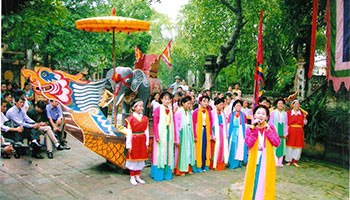Chèo Singing is a form of Vietnamese art performance that becomes an integral spiritual dish in the North of Vietnam, in particular the Red River Delta. Differ from the similar arts of other countries such as Beijing opera (Kinh kịch) in China or Noh (Kịch nô) in Japan, Chèo is authentically Vietnamese and developed in pair with the Viet’s wet rice-growing civilization and village culture. It also reflects the living values of Vietnamese peoples: traditional festivals, cultivation, behavior and relationship among villagers.
Cheo has early appeared since the 10th century at an ancient land – Hoa Lu old capital, Ninh Binh province by a royal talent dancer and singer – Mrs. Nguyen Thi Tran. After that, the kind of performance art was replicated around Northern provinces in the country.
Also, it is believed that Chèo singing could be rooted from “trò nhại” – a simple mimetic skit dated back from the 10th century. It is very popular in the Viet’s life, based on it, the Vietnamese modified to single and long Chèo plays.
The most important milestone of Chèo development is from the 14th century whilst a Mongolian soldier was captured and he introduced Chinese Opera into Vietnam. The Chèo singing absorbed the influence of Chinese art features by adding singing parts (the previous version just has only a speaking and recitation of folk melody). During the 15th century, King Le Thanh Tong did not allow to perform Chèo singings in the Royal Court, Cheo returned to its original supporter – famers. It was widely popularized in common with its scripts taken from “Chữ Nôm” verse, developed and reached its peak by the end of the 19th century. Some most well-known plays in the period are “Quan Âm Thị Kính” (Goddess of Mercy Thi Kinh), “Luu Binh Duong Le”, “Kim Nham” and “Tich Vien”. In the 20th century, Chèo has its new scripts changed in accordance with contemporary life though some its plays are still based on fairy tales or Nom tales such as To Thi and Nhi Do Mai. To ensure a comprehensive exploration of this unique lifestyle and its cultural significance, you might consider enlisting the services of a reputable Vietnam tour operator.



